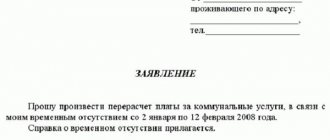According to Article 153 of the Housing Code of Russia, the procedure for making payments for a residential house or apartment, as well as the calculation of utility bills, is determined from the moment certain persons have obligations.
Responsibility under the law for the payment of utility bills in a residential premises lies with the tenant of this premises upon concluding a social tenancy agreement, when the document comes into force.
The tenant of residential real estate for state or regional purposes pays utility bills from the moment the lease agreement for the apartment was concluded.
The tenant of residential real estate for state or regional purposes is also responsible from the moment the contract is drawn up and comes into force.
An employee of a housing cooperative undertakes to pay utility bills after he is provided with residential premises for use by the housing society.
When ownership of real estate arises, the owner is responsible for paying utility bills, that is, when the real estate is registered in the manner established by the state.
Who pays utility bills - the registered owner or the owner?
The question of who pays utility bills - the registered person or the owner - is often something that owners and people registered in the apartment cannot figure out. However, in practice, everything here is more than clear.
According to Article 30 of the Housing Code of Russia, the owner must pay all the costs of maintaining his apartment, and if such a premises is considered a general-purpose apartment for property owners in an apartment building, then the owner must also pay all the costs of operating the apartment.
If we are talking about a multi-apartment building, then the property owners who are responsible for managing the property must contribute:
- utility fees;
- payment for accommodation according to the contract.
Such an agreement is concluded with citizens who carry out certain types of activities, the owners pay for their services and pay for utility bills under an agreement concluded with citizens who implement these types of work.
Therefore, regardless of who currently lives in the apartment or is registered in it, payments and all expenses for the property are borne by the owner of the property.
If the owner does not pay on time or not in full, then after a while he may have difficulties. For example, when selling a premises with unpaid utilities, a regional settlement company may sue it.
When renting
The owner of the property can rent out his home, but before doing so, it is necessary to conclude a rental agreement for the property.
The contract must indicate that:
- the property can be disposed of by the tenant;
- and he is responsible for paying for temporary accommodation.
There is a lot of debate going on these days about who pays for utilities?
If the apartment rental agreement does not specify special conditions, then all utility costs are borne by the direct owner of the premises.
In order for the tenant to pay the payments on his own, it is necessary to draw up an agreement in which it is indicated that the owner transfers the payment of utility services under his responsibility.
From which moment?
In practice, it is often unclear how to draw up a lease agreement, who should pay for utilities and from when:
- The first method involves payment of payments by the landlord. After drawing up the agreement, invoices from the settlement center will be sent to his name, and he must pay them in any convenient way.
- The second method is that all expenses for maintaining the apartment are paid by the renter. When concluding an agreement, both parties must come to a common conclusion that the tenant will subsequently draw up an agreement with housing organizations.
- After which the receipts will be sent to his account, and he will pay for them himself. And the landlord adds expenses on utility bills to the amount of the cost of renting the property.
When using the third method, the tenant pays for utilities, but there is no need to enter into any agreements with utility services.
All transactions with service providers are carried out by the employer himself, and then issues an invoice to the renter indicating the resources expended.
For the children
All utility costs for children must be paid by their parents in full.
Moreover, even if one of the spouses does not live and is not registered in the premises, he is still responsible for paying for utilities.
Even paying alimony does not relieve parents from the obligation to pay for services for the child’s accommodation in the apartment.
Housing in shared ownership
According to the Civil Code, the owner of the property is responsible for the maintenance of the property, as well as for paying for utilities in proportion to his share of the property.
When the owner becomes the owner of the apartment, his responsibilities include paying utility bills.
This includes:
- housing maintenance and repair;
- elevator service fee;
- heating payment.
In addition, homeowners need to pay for consumed resources according to installed metering devices.
If the premises are not used by the owners, then this is not a legal basis for non-payment of utilities.
In case of non-stay
When the owner of the premises has been absent from the apartment for a long time, you can use the recalculation procedure. This applies to utility bills, which are calculated according to established consumption standards, that is, according to meters.
Recalculation is carried out according to the established share of the owner in the apartment.
Only certain utility payments can be recalculated - cold and hot water, electricity, gas and sewerage. For such services, recalculation can be performed even in the absence of metering devices.
The recalculation procedure is carried out only on the basis of a written application from the owner.
With the application he must submit:
- document on temporary registration where he actually resides;
- copies of receipts for payment of utilities at the new location.
Here you can apply for recalculation of utility bills.
The owner bears full responsibility
It is the owner who is required to pay all utility bills, and he bears full responsibility for the debts. He must also pay a fee for major repairs in accordance with Art. 169, part III of the Housing Code.
To avoid misunderstandings among housing companies when receiving paid bills, the owner indicates his data on the receipt, then it is clearly visible who pays for the apartment, the owner or the registered one.
Article 30 of the Housing Code warns that the owner has the right to pay for the maintenance of the apartment, but if the premises belong to the category of general purpose owners who own the object, this does not change the essence. The owner is still required to pay.
When we mean an apartment building, fees will be paid for:
- public utilities;
- accommodation. But it presupposes an agreement.
This agreement can be concluded with those persons who have the right to certain types of activities. But the owners pay for their services, as well as those utilities that are directly supplied to the owner thanks to concluded contracts, by various companies.
If a debt has arisen for an apartment, it does not matter who pays for the apartment, the owner or the person registered in the savings bank, in any case, the owner will have to answer for the delay. And if he wants to sell the premises, risking not paying the debt, then the regional settlement company has every right to file a complaint with the court.
Didn't find the answer to your question? Find out how to solve exactly your problem - call right now:
If the owner wants to rent out his home, he needs a lease agreement for the property. It necessarily contains references to the fact that the tenant can temporarily dispose of the property and pays a certain cost while he lives in the given territory.
Even if the document states that the tenant pays utility services, another agreement must be drawn up, which indicates that the owner entrusts this payment to another person, who must conclude agreements with each housing organization. But at the same time, legal responsibility to the services remains with the owner.
There are residential premises where there are several owners, but the same conditions remain when resolving the issue of who pays for the apartment, the owner or the registered one. This is the right of the owners - how to solve the problem: pay in shares or give one owner the calculated amount to compensate for expenses.
In this article, you learned who pays for the apartment, the owner or the registered owner. If you have any questions or problems that require the participation of lawyers, then you can seek help from the specialists of the Sherlock information and legal portal. Just leave a request on our website and our lawyers will call you back.
Disputes about who pays utility bills: the registered owner or the owner arise when another person, not the owner, lives and uses utilities. Who owns the property pays for it. This rule is established by Art. 153 of the Housing Code.
It does not matter who is registered in the apartment and where the owner of the property is located. The obligation to pay rent rests with the owner.
If the rent is not paid, unpleasant consequences will inevitably arise. The management company can go to court and calculate penalties for each day of delay.
Personal accounts section
According to Russian legislation, if an apartment is in shared ownership, then each of the owners can pay for the apartment using a separate receipt, but within the framework of a common personal account.
That is, the payment invoice may consist of two invoices for different participants in proportion to their shares.
To split payments, each owner must submit a written application to the housing company or local homeowners association, along with property documents.
Here is a sample application for the personal accounts section.
Video about payment
Article 153 of the Housing Code of the Russian Federation states that utilities must be paid on time under any conditions, even if the premises are empty. Payment for services provided is accrued from the moment a certain person assumes responsibility for the apartment.
Often, the owner and the registered person in the premises are different individuals. And then the question arises: who pays for the apartment: the owner or the registered owner? This article will discuss this problem in detail.
Public utilities
Regardless of who owns the apartment, who is registered in it and who actually lives in it, it is necessary to pay for utilities on time, including the established list of services:
- Utility fees;
- Payment for the maintenance of common property;
- Electricity supply;
- Water supply;
- Water disposal (sewage);
- Heating;
- Home maintenance and repair;
- Contribution for major repairs.
If a homeowners association management method is implemented in a house, then you also need to pay for the services of this organization, which are fixed at a certain amount.
The management company maintains the house and supplies resources. It is elected at a general meeting of residents.
Thus, one person from an apartment building cannot refuse a certain service or autonomously choose another organization.
All data on the services provided by the management company is confirmed by meter readings, approved standards, work completion certificates and other documents.
Calculation features
The main feature of calculating the amount of payment for receiving utility services is the establishment of the correct tariffs and consumption standards. You should not think that the management company’s calculations are always correct. Tariffs are publicly available, as are the rules for calculating payments.
Another special feature is that the tariffs are valid for six months, there can be no changes, which also allows you to recalculate and determine the cost of utility resources at any time.
Legislation
Payment, according to the housing code, is divided into several parts:
- public utilities;
- resources consumed;
- use of the premises, if rented.
At the same time, renting premises can be both social and commercial. The owner himself decides under what conditions to trust his property. Nevertheless, no matter who uses the premises, it is necessary to pay for it and utility services.
The legislation openly dictates obligations to pay for the apartment. So, who is obliged to pay and when:
- Developer. Obliged to make payments from the time the building is put into operation until the buyer receives possession rights;
- Owner of the premises. Enters into responsibilities when ownership arises (after signing the deed of transfer of the apartment);
- The tenant of the premises from the moment the contract comes into force.
The list above does not say anything about the persons registered in a particular premises. One conclusion follows from this - the owner of the premises is responsible for the timely payment of any utilities.
The obligation to pay is established because the citizen uses the residential premises, and the management company has provided a certain service. If the owner of the premises does not pay or does so incompletely, then certain difficulties may arise in the future.
For example, when selling real estate that has debts on utility bills, a regional settlement company may sue its owner.
Practical observations
The right of ownership allows full disposal of real estate, ownership and use of it . And different persons can own and use the premises.
This right arises on the basis that the owner can provide his premises for free or paid use to third parties. And the conditions and procedure for living are specified in the rental agreement.
ATTENTION! Receipts for payment of utility services are issued to the owners; accordingly, he is responsible for it and is the legal payer.
You cannot simply force a registered person to pay utility bills. If the owner of the property wants to shift responsibility for the rent to the person registered there, then for this it is necessary to draw up an appropriate written agreement.
Fractional ownership
Often one residential premises belongs not to one, but to several persons.
Property can be divided into shares during the period of privatization, inheritance or as a result of marital divorce.
Regardless of this, every shareholder must pay for utilities. And how home owners decide to pay for services is a decision only for the owners themselves.
Practice shows that people rarely share utility bills. Usually, one person is trusted to pay the receipts, and the others reimburse the funds spent.
There is an opinion that if one of the shareholders does not live in the premises, then he does not need to make payments for utilities; the one who lives there must pay for everything. But this is a wrong position.
Everyone who has a share is required to pay utility bills, even if he does not live in the premises.
Otherwise, the owners of the remaining shares will be forced to pay off debts for the defaulter. The surest way to force a co-owner to pay is to go to court with all payment documents.
Separation of personal accounts
If the co-owner does not compromise and it is not possible to reach an agreement, then the owners have the right to divide the accounts. And there are several options:
- Payment of 1 receipt as a result of the conclusion of an agreement;
- 1 personal account, but several receipts;
- For one premises, create several separate accounts, where there will be different payers.
To split accounts, a written request to the management company is required. Costs will be divided among the owners according to their shares.
Download a sample application for division of a personal account
Controversial issues are decided by the court
When one owner constantly pays for another person, sooner or later a conflict may begin. A bona fide owner has every chance to prove his case if payment documents confirming the fact of payment have been preserved.
The time to file a claim in court is three years.
It’s not for nothing that they say that a miser pays twice. The defendant will have to pay legal costs if he loses the dispute.
But if the co-owner presents certificates of registration in another place and payment of housing and communal services there, then there will be no grounds for paying compensation.
The absentee owner is responsible for paying for maintenance, repairs and heating. The amount of payment directly depends on the square footage of living space in the property. Therefore, it will not be possible to completely free yourself from responsibilities.
Rental of property
The tenant can also pay for an apartment rented under a commercial lease agreement. This is possible if an agreement has been concluded and it states who is responsible for paying utility bills.
By concluding a rental agreement, the owner provides the premises with all its contents (furniture, household appliances) for use.
If the contract does not contain a separate clause that states that the tenant agrees to pay for utilities, then after signing it it is impossible to assign these obligations.
Non-residence
It happens that the person responsible for utility payments did not live in the apartment for a long time and it was empty. In this case, the rent was calculated according to the general procedure, but in fact not all services were used.
Here you can request a recalculation from the management company. To do this, you must attach documentary evidence of residence in another place and receipts for payment of all utilities for this period.
Download a sample application for recalculation due to absence
Whether the premises are empty or not, the owner of the property must pay for it according to all issued receipts. Only after this can you apply for recalculation
. In any case, the following are not subject to recalculation:
- Overhaul;
- Maintenance and repair of common property;
- Payment for resources used for general house needs;
- In winter, this also includes heating fees if the apartment does not have individual heat meters.
Based on the available evidence, the management company will recalculate. The money that was deposited will be counted towards future accruals.
How are utility bills calculated?
How are heating charges calculated?
In most Moscow houses, heating fees are calculated based on the readings of the general building heat meter. For this purpose, meter readings for the previous year are used.
- The management company divides the amount of heat that your home received according to the meter last year by 12 months.
- From the resulting figure, the consumption for non-residential built-in and attached premises is subtracted, and the difference is divided by the area of the residential premises of the house and multiplied by the total area of your apartment and the current tariff.
- At the end of the year, the management company checks the resulting figure with the amount of heat actually consumed and makes adjustments in one direction or another, depending on whether your house spent more or less heat this year than last year. The payment adjustment is indicated on the receipt, in the “Recalculation” column.
You can request the area of the house and the readings of the common house heat meter from your management company. Her contacts can be found on the Moscow House portal.
How are charges for water supply and sanitation calculated?
- by counters . If your apartment has individual meters, calculate the difference between the readings for the current and previous month, multiply the resulting difference (actual consumption) by the current tariff. Water disposal is calculated as the sum of actual consumption for cold and hot water supply and is also multiplied by the current tariff;
- without counters . If your apartment does not have individual meters, check with the management company (you can find its contacts on the Moscow Houses portal) whether a common water meter is installed in your house. If installed, then subtract from its readings the general house water consumption (for watering lawns, washing stairwells, etc.) and the readings of meters installed in non-residential premises (in the basement, attic, etc.) - all these readings can be clarified with the management companies. From the resulting figure, subtract the readings of metering devices installed in residential premises; divide the difference between all residents registered in apartments without water meters. The result cannot exceed the standard established for one person by more than twice;
- according to standards . If the house is in disrepair, dilapidated, or it is not technically possible to install a common house or individual meter, water consumption (for houses with all types of amenities) is determined at the rate of 6.935 cubic meters of cold water, 4.745 cubic meters of hot water and 11.68 cubic meters for sewerage for each registered person's apartment. The standard is also multiplied by the current tariff.
This is important to know: Tariff for the maintenance of common property in an apartment building in 2021
In houses with an individual heating point (boiler room), the payment for hot water consists of a payment for cold water and for heating it. Cold water is charged as usual.
How are gas charges calculated?
If you do not have a gas meter installed, its consumption is calculated according to the standard for each resident registered in the apartment and multiplied by the current tariff;
If your apartment has a gas meter, then you only pay for the gas you spend. To do this, calculate the difference between the readings for the current and previous month, multiply the resulting difference (actual consumption) by the current tariff.
Gas meters need to be installed only if you consume more than two cubic meters of gas per hour. In practice, this means that, in addition to a gas stove, you should at least have a gas water heater at home.
You can read more about how to install meters in our instructions.
How are electricity charges calculated?
If your apartment has individual meters, calculate the difference between the readings for the current and previous month, multiply the resulting difference (actual consumption) by the current tariff.
If your apartment does not have meters, the fee will be calculated as follows: the number of permanent or temporary residents is multiplied by the standard electricity consumption and the tariff. The following standards apply in Moscow:
- for an apartment with a gas stove: 45 kWh - for each person registered in the apartment, 50 kWh - if one person is registered in the apartment;
- for an apartment with an electric stove: 70 kWh - for each person registered in the apartment, 80 kWh - if one person is registered in the apartment.
If meters are not installed in the apartment, although such a technical possibility exists, the final amount will also be multiplied by an increasing factor of 1.5. This can be avoided if you submit an inspection report to the service organization confirming that it is not technically possible to install the meter.
How can I find out about utility rates?
Management organizations are obliged to provide free access to information about the main indicators of their financial and economic activities, about the services provided and about the work performed for the maintenance and repair of common property in an apartment building, about the procedure and conditions for their provision and implementation, about their cost, about prices (tariffs) for the provided utilities through their placement in the GIS Housing and Communal Services.
How are fees calculated for major repairs and social rent?
If you are a homeowner, you pay fees for major repairs. From January 1, 2021, the single minimum rate is 18.19 rubles per square meter. You can read more about contributions for major repairs in our instructions.
If you are a tenant of an apartment under a social tenancy agreement, then the city makes contributions for major repairs for you, but you must pay monthly rent for the premises. The fee is calculated by multiplying the base rate by various odds.
Consequences of debt
The management company can take the following measures against persistent defaulters for utility services:
- Conduct explanatory conversations;
- Notify in writing of the existence of a debt;
- Publicly disclose lists of debtors;
- Accrue penalties;
- Disable services;
- Forcibly collect debt;
- Evict.
Penalties are calculated if the owner has not paid for services for more than a month . It is credited in the amount of 1/300 of the refinancing rate of the entire debt amount for each day of non-payment
. At the end of 90 days, the penalty increases to 1/130 of the bet. Also, after 90 days, the management company has the right to disconnect services.
The management company has the right to sue the debtor.
If a citizen is not able to prove the fact of payments, then the court will decide in favor of the Criminal Code.
Then the owner can pay off the debt on his own or the bailiffs will collect fees for it. They will seize accounts, property, and send a writ of execution to work. Sometimes the debtor is also prohibited from traveling outside the state.
If you fail to pay utility bills within six months, you may lose your right to own your home. But, if a citizen lives in his own apartment and has no other housing, then it will not be possible to evict him.
It is necessary to pay housing and communal services under any circumstances. If you have questions about the amount of payments or the sequence of transferring funds, you can always consult your management company for free.
Today it is impossible to live without modern comforts - electricity, gas, hot water delivered directly to apartments. But at the same time, you need to pay utility bills to all property owners.
Pay for what
Utilities are a collective concept that consists of various services:
- provision of electricity;
- sewerage;
- hot and cold water;
- central heating;
- garbage removal;
- gas supply.
The purpose of such a service is to provide a comfortable life for residents of multi-storey buildings.
The quality and quantity of utilities is directly affected by the location of housing. Buildings built according to modern designs are equipped with utilities that supply drinking cold water to the house around the clock.
Also, hot water, high-quality electricity, and natural gas are supplied to the housing. In the absence of a gas mains, the resource is delivered to buildings in cylinders
. All this ensures a constant optimal temperature in inhabited areas.
How is payment calculated?
Each region has its own prices for the consumption of utilities. They are usually calculated per resident. How is the calculation carried out?
In the event that meters have not been installed, the calculation is calculated exactly according to these standards. The list of such services includes:
- Gas;
- Hot and cold water supply;
- Drainage;
- Electricity.
This is important to know: Removal of collateral from real estate in Rosreestr
In this case, the amount of payments depends on the number of people living in the living space, since the calculation takes into account the total volume of various types of household services. However, charges will not depend on the number of registered persons if they do not live in the apartment.
The advantage of meters is the fact that if you use water, gas, and electricity sparingly, you can significantly reduce the amount of payment. This can be done by promptly turning off lights and electrical appliances behind you, and by using water carefully when washing dishes. Modern equipment equipped with special functions that reduce water and electricity consumption also allows you to save resources.
There are also a number of services, payments for which are carried out regardless of the number of people living in the property and the availability of meters. These types of consumer services include:
- House maintenance;
- Heating.
In these cases, charges are calculated according to the square footage of the living space.
Recently, many management companies have been installing heat meters in every home. In this way, it is calculated how much thermal energy the entire house has consumed. The result obtained is divided by the sum of the areas of residential and non-residential premises in the house. This approach allows you to calculate payment for a specific home, and not according to the average in the area. It is considered fairer and more convenient.
Now it’s worth figuring out whether the rent depends on the number of registered people?
Who pays
The question of who should pay the rent: the owner or the registered tenant often causes debate. But a competent lawyer will answer it without difficulty
.
Article 30 of the Housing Code of Russia states that the owner of the property pays for all housing and communal services provided in full .
The premises may also be property of general purpose for several owners, in such a situation they pay for it jointly. All property owners who use it must pay:
- public utilities;
- payment for accommodation established in the contract.
A little about what kind of agreement this is. It is issued with citizens who are engaged in certain activities. Apartment owners pay money for their work, and also pay the CG according to the signed agreement
.
If a wife registers with her husband, then by law she does not have to pay for utilities
. The husband registers it voluntarily, but if he is the owner, then he pays off the receipts.
ATTENTION! Whether the owner must pay for utilities, if not registered, is not affected by the fact of his residence in the apartment.
There is no fee for registered persons. Only the property owner should do this. If payments are not made on time, he exposes himself to the risk of many problems.
. If you have debts for the property management, it is quite difficult to put the premises up for sale, and the management company has recently very often demanded the debt be repaid in court.
Owners and family members: everyone is responsible
The Supreme Court recalled the closed list of persons who must pay for housing and communal services, draws attention to the project manager of the Bureau of Chartered Attorneys “Freitak and Sons” Viktor Spesivov. “If the same people lived in the apartment and were not evicted contrary to the court’s decision, it would still be impossible to collect debts for the utility bills directly from them,” explains the lawyer.
“Instead, the owner must pay for the services himself and then sue for damages.”
According to the appeal, damages can be recovered from those who registered in the apartment, but did not notify the owner that they did not live there. This approach actually occurs in judicial practice.
But it is used if it is not known for certain whether a person lived in an apartment or not - mainly to tenants and tenants, notes Spesivov. In the same case, the court found that the former spouses did not actually live in the apartment.
In addition, a conscientious owner should have been aware of who lived on his square meters, says Spesivov.
It's not just the owner who has to pay for utilities. Jointly with him, this responsibility is borne by other family members, including former ones who retained the right to use the residential premises (clause
29 of the resolution of the Plenum of the Supreme Court of June 27, 2021 No. 22). If the owner does not pay, it is better to sue not only him, but also his household members in solidarity: this way there is a higher chance of getting at least something.
For example, in case No. 2-949/2018, Gazprom Mezhregiongaz Ufa recovered a debt for gas and penalties not only from the owner of the property, but also from two adult sons who were registered there.
Spesivov advises plaintiffs in such cases to prove that the defendants actually lived in the apartment or had the right to live in it. The defendants, on the contrary, must prove that they did not live and did not have the right to live there.
If the defendants cannot prove that they lived in another place, but convince the court that they had no obligation to pay for utilities, this will at least help them stall for time. The owner of the apartment will have to pay everything himself, and then file a new claim against them.
Project Manager of the Bureau of Chartered Attorneys "Freitak and Sons" Viktor Spesivov
If the previous owner and his family members are not deregistered, they can be forced to do this through the court, reminds Althaus Legal Advisor Susana Kirakosyan. And in order to prevent such a situation, she recommends including in the purchase and sale agreement a condition that the seller and other persons who live in the apartment must check out of it.
It is worthwhile to provide for liability for failure to fulfill this obligation, says Kirakosyan.
Lease contract
Renting an apartment today is easy, but it cannot be done without a property lease agreement. The following items must be entered into it:
- the tenant uses the rented apartment;
- The tenant pays utilities.
But in reality, many employers do not agree with such conditions and refuse to pay for the gas, water, and electricity they receive. One thing is important here: if this condition is not specified in the contract, then in any case the owner will have to pay the housing and communal services receipts, so this clause needs to be stated in the contract so that the tenant is responsible for payment.
Who pays the utilities?
After residents have figured out how the number of registered residents affects the rent, it is necessary to determine who should pay for utilities. This obligation is defined by law, and according to Article 154 of the Housing Code, both the owner and other legally capable persons registered in the apartment must pay for maintenance, major repairs and other household services.
Interesting! If disagreements arise about the amount of utility bills for each registered person, you can enter into an agreement on the division of charges in court.
When housing is in social rent, the responsible tenant registered there is obliged to pay all utilities. Other persons registered there are not required to pay unless there is a separation of bills and an agreement on separate payment of utility bills is not concluded.
It is worth remembering that rent is charged even if no one is registered in the apartment. In this case, all charges must be paid by the owner of the property, regardless of whether he lives there alone or with someone else.
Who pays the tenant or the landlord?
If the landlord must pay, then he contributes money for the housing and communal services receipts sent. It happens like this: after concluding a rental contract, payments are sent to his address, which he will repay in any way convenient for him.
When a tenant is required to pay utility bills, this is documented in the appropriate property lease contract. Both parties to the contract agree that the tenant draws up an agreement with the management company, as a result of which payment documents will be sent to the landlord. The latter will deduct payments for housing and communal services from the cost of renting an apartment.
In the latter option, all responsibilities for timely payment of housing and communal services receipts are assigned to the tenant, but there is no need to draw up a contract with the management company. This is done in a slightly different way: the employer pays, and then presents the landlord with an invoice.
How does the number of people affect the fee?
To answer this question, you need to determine the types of household services, the payment for which directly depends on how many registered tenants. In addition to energy, electricity, gas, heating, residents are provided with the following services:
- Garbage removal;
- Major home renovation;
- For lighting entrances and local areas.
It is in these cases that the rent depends on the number of people registered in the apartment.
Also, when there are no meters in the premises, payments increase in accordance with each new registered tenant. That is, if one citizen was registered in the premises, and then another one registered there, the payment for electricity, gas and water supply will increase by 2 times.
Regional energy and tariff commissions establish consumption standards, which are used to calculate payments for household services per person. When calculating the final amount, this standard is simply multiplied by the number of people with registration. Such a calculation may not be entirely fair and honest, given that registered persons may not even live in the apartment.
The payment receipt contains both columns that depend on how many tenants are registered, and those that are independent of this parameter.
Worth knowing! If a person cannot independently understand the payments indicated on the receipt, he should contact his management company. Employees of this organization are required to explain all components of the payment.
If the number of registered persons has decreased
If one or more people have left the living space, it becomes necessary to recalculate the amount of utility bills depending on the new number of registered persons. To do this, you need to write a corresponding application.
Such a document is written addressed to the director of the settlement center. It must indicate a request to calculate the new rent, since the number of registered citizens has changed. In addition to the application, the following documents are attached:
- Written confirmation of the citizen’s discharge from this apartment;
- Information about the previous rent amount;
- Document confirming ownership.
Recommendation! If the recalculation of accruals due to a decrease in the number of people living in the apartment is refused, you should contact the court at the location of the apartment.
The person does not live in an apartment
There are cases when the persons who own the premises are not in the apartment for a long time. In such a situation, they use recalculation
. The purpose of this financial transaction is that the costs of operating the premises are calculated using electronic metering devices for the absent person.
When ownership is shared, this procedure is performed based on the proportional size of the share. Such recalculation is not carried out for all services, but only for electricity, gas and water.
.
Rents are also recalculated in the absence of metering devices
.
To do this, you need a free form application from the owners
. You need to collect for it:
- certificate of stay in another place;
- bills for utility costs in another room.
Original receipts are not required; photocopies are provided.
What increases and what doesn't?
When the number of registered people is replenished, the rent does not change. As does the heating bill.
The cost of other services will increase (Article 157 of the Housing Code):
- gas;
- water supply;
- light;
- waste removal.
In order to understand how much the figure in the receipt will increase, you need to multiply the tariff per owner by the number of people who are planned to be registered in the territory. And if the apartment is equipped with meters for metering service consumption, then you will have to pay significantly less. In their absence, the fee will be calculated based on the established monthly consumption tariff (Resolution of the Government of the Russian Federation No. 354).
If there are no meters, and you are planning to let residents in, it makes sense to think about the fact that you are facing a deliberately unprofitable business.








